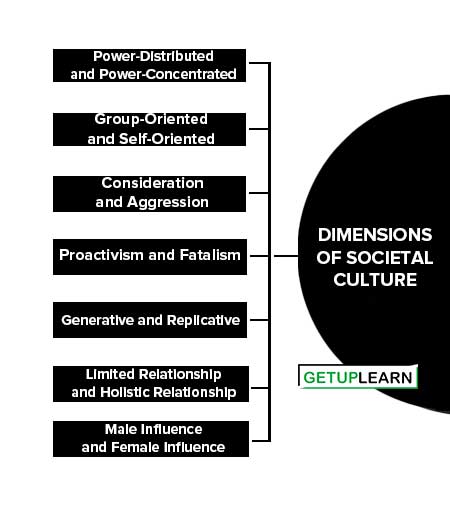Table of Contents
Dimensions of Societal Culture
Societal culture is a complex and multi-dimensional concept that encompasses various aspects of a society’s beliefs, values, norms, customs, traditions, language, arts, and social institutions.
While cultural dimensions can vary depending on the context and specific society being studied, the following are some key dimensions commonly used to analyze and understand societal culture:
- Power-Distributed and Power-Concentrated
- Group-Oriented and Self-Oriented
- Consideration and Aggression
- Proactivism and Fatalism
- Generative and Replicative
- Limited Relationship and Holistic Relationship
- Male Influence and Female Influence

Power-Distributed and Power-Concentrated
Power is either distributed more equally among the various levels of a culture or is more concentrated.
Group-Oriented and Self-Oriented
people in self-oriented cultures perceive themselves to be more independent and self-reliant. In group-oriented cultures, ties between people are tight, relationships are firmly structured, and individual needs are subservient to collective needs.
Consideration and Aggression
in aggression cultures, achievement is stressed, competition dominates and conflicts are resolved through the exercise of power and assertiveness. In contrast, consideration societies emphasize relationships, solidarity, and resolution of conflicts by compromise and negotiation.
Proactivism and Fatalism
this dimension reflects the proactive or ‘we can change things around here’ attitude in some cultures, and the willingness to accept things as they are in others–a fatalistic perspective.
Generative and Replicative
some cultures appear more predisposed towards innovation, or the generation of new ideas and methods, whereas other cultures appear more inclined to replicate or adopt ideas and approaches from elsewhere.
Limited Relationship and Holistic Relationship
in limited relationship cultures, interactions and relationships tend to be determined by explicit rules which are applied to everyone. In holistic cultures, greater attention is given to relationship obligations, for example, kinship, patronage, and friendship, than to impartially applied rules.
Male Influence and Female Influence
In some societies, the male domination of decision-making in political, economic, and professional life is perpetuated. In others, women have come to play a significant role.
